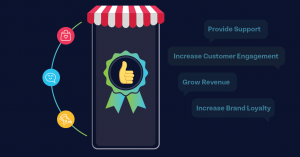
AI and CRM
Whether they’re ordering food or asking for consultations about their finances, people interact with chatbots and applications of artificial intelligence (AI) at least every day. Chatbots are revolutionizing the customer support game as we know it and if you want to keep up, you’ll need to implement chatbots in your CRM strategy.
Why chatbots and applications of AI should be part of your CRM strategy
Though a customer relationship management (CRM) software tool is fantastic at helping to streamline and automate marketing and sales operations, a chatbot can drive your CRM strategy ahead of the curve. Still not convinced? Below are just some of the reasons why chatbots and CRM go hand-in-hand.
They offer a seamless experience
Chatbots can respond to queries at a speed that humans could never hope to match. For simple queries, chatbots can provide relevant answers that consumers need. And with the progression of natural language processing (NLP), the responses do not seem “canned” or robotic.
Linking your chatbots to social media also allows for seamless verification and customer experience because they can “remember” previous conversations. The applications of artificial intelligence in chatbots are ideal for immediate responses to easy questions. If there are more difficult questions, you can seamlessly lead your customers to human helpers so that they can better help with inquiries. By not having your customers wait on long phone queues for help, you’ll guarantee their return to your business.
Chatbots are effective sales staff
The future best performing sales agent might be the CRM itself if chatbot integration continues taking off. Clickatell Touch allows you to deploy your own chatbot which can easily mimic how a human responds to a conversation. These AI assistants could be introduced as part of your sales team with a name, a title, and an email address.
Consumers now prefer interacting with chatbots when shopping online. In fact, some are even demanding them over human assistance. If you ensure that your chatbot has a “human” voice, they can be highly effective sales staff, allowing you to adjust your CRM strategy to sell directly to customers from within your CRM software. This makes them both an effective tool for your sales team and an extra salesperson for when you are short staffed.
Smart CRM
Applications of artificial intelligence and CRM systems go hand-in-hand. It’s not always easy to key data into your CRM system, especially when you’re dealing with a bloated system and too much information. The process of logging into the system and switching through multiple tabs and screens to enter and save information takes time that could be used on closing a sale.
Integrating a chatbot into your CRM system can remedy this. One of the major benefits of chatbots is the single message window where a customer can type their message. This makes capturing data from conversations much easier and more efficient. A chatbot can also go through important workflows continuously and seamlessly record answers. They can organize all of the difficult tasks and follow up on important activities to help sales representatives manage their time.
How to implement chatbots into your CRM strategy
Give it a personality
When using chatbots as part of your CRM strategy, it is important to give them a unique “voice” and “personality”. This is because your consumers should not feel as though they are talking to a robot. You want to give them as authentic an experience as possible.
You’ll need to ensure that your chatbot’s voice and personality align with your brand, so that consumers have a seamless experience whether speaking to a salesperson or a chatbot. When consumers are not interacting with your bot, you’ll need to think of ways to re-engage them using the right mobile CRM marketing techniques without being pushy or annoying. Offer them useful information at pertinent times, using past conversations to personalize the messages.
Service-oriented versus a temporary chatbot
You’ll need to decide whether you want a service-oriented chatbot (which is permanent) or a temporary chatbot (used only for promotional events). A service-oriented chatbot will be used for conversation-based interaction with customers and is a long-term solution to customers’ questions and the company’s responses.
A temporary chatbot is just that, temporary. But it can be used during a specific promotional event to lessen and ease the workflow of your salespeople. These are also conversational chatbots but are more geared towards helping customers to find out about the promotional event, get information on special pricing, or otherwise interact about and during, the promotion.
Keep chatting away
Integrating chatbots into your CRM strategy is an effective way to reach customers. They offer a seamless, enjoyable experience to consumers and are effective sales “agents” in their own right.
You’ll be able to develop a smarter CRM which allows your staff to spend more time closing sales and less time collecting data, and, with an on-brand personality, your chatbot is sure to surprise and delight even the most difficult consumer. Read our previous piece to find out more about why consumers prefer applications of artificial intelligence over dealing with salespeople and how this can help your business.
Explore other articles
Step into the future of business messaging.
SMS and two-way channels, automation, call center integration, payments - do it all with Clickatell's Chat Commerce platform.








